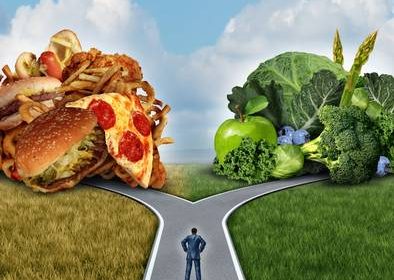Five food fads to avoid this year

At this time of year, fad diets will be coming at you from all angles, claiming to be the ultimate weight-loss option, offering speedy results while curing your body of all that’s harming it. The first thing to be aware of is that quick weight-loss is often not the healthiest option. Slow fat-loss, in a body that contains too much, is often more sustainable and more preserving of lean tissues. It’s also difficult to avoid malnourishing the body if under-nourishing it to extreme levels.
The second thing to note is that fad diets are not sustainable. For example, they may be low in carbohydrate, fat or protein and are rarely tailored to the individual. More often than not, this doesn’t lead to long-term results. Bearing this in mind, here are my top five fads to avoid this New Year.
1 Quit quitting foods
There is no such thing as a good or bad food, just a good or bad diet! If you consume one food that you deem less healthy, this does not ruin the health benefits of the other 100 healthier foods you have eaten that week. Your body will reflect what you consistently do.
All foods have a place in a healthy diet. Instead of restricting foods, aim for including foods. A healthier aim is to eat as much variety as possible to ensure you’re eating a host of nutrients.
The first step is to base your diet on plants. Eating a diet rich in fruits, vegetables, wholegrain carbohydrates, legumes, nuts and seeds is a recipe for better health. Keep it varied and keep it colourful! As fads come and go, the healthy guidelines do not change all that much. As I outline on pages 28 and 29, drink plenty of water, eat lots of fruit and vegetables, include protein at each of your meals, choose wholegrain carbohydrates more often than processed grains and tailor your intake to your activity levels.
Above all else, focus on variety, wholefoods and enjoyment from food.
2 One diet does not fit all
The idea that there is one diet that will suit everyone is ludicrous. When considering what dietary pattern may suit you, it’s important to look at your body fat levels. If you’re very lean, you may need more energy-dense foods. If your body fat is high, you may need to consider eating less energy-dense foods.
If your bloods results show high cholesterol, high blood sugar, low iron, low vitamin B12 or changes in the functioning of your liver or kidneys, of course this needs to be considered. What’s more, every individual is unique, with a unique medical history and their own set of genetic risks.
For example, a diet needs to be tailored to the risk or the presence of type 2 diabetes or other conditions and diseases. Food is also more than fuel, and is more than a tool for better health. Food can have a lot of meaning to people whether it’s social, religious or otherwise.
Considering all of this, alongside taste preferences, it’s really no wonder that one diet does not fit all.
3 Extreme calorie deficits
Our bodies need nourishing. We have to nourish to flourish. When an extreme energy deficit is created, the body cannot feed the various systems in the body.
For example, calories of energy need to be provided to our digestive system, reproductive system and immune system in order for them to be able to function at their highest level. Digestive issues, loss of period or problems with sex hormone levels as well as regular infections can result from extreme diets.
A great way to visualise this is to consider your body to be a factory and calories as money. Some diets provide so little calories that it’s only enough to keep the lights on and not enough to pay the heating, the employees and energy costs to run the machinery.
If you scrimp on calories, compensations will be made. The greater the deficit, the less your body works.
4 Avoid gimmick foods
Eating better is often considered to be more expensive. This is in part due to the cost attached to the latest gimmick food. Every food that the earth offers is a superfood, whether or not its super powers have been discovered yet.
Lots of things impact upon the nutritional content of the foods we eat, from the soil it grew in, how long ago it was pulled from the ground, how it was stored, and how it was cooked.
So, even the healthiest choices can be nutritionally-depleted when you finally get to eat them.
As boring as it sounds, eating a lot of different foods, particularly those grown and produced in Ireland, is a healthier focus than reaching for the latest gimmick that has been mass-produced and transported across the world to end up on your plate.
5 Do not take recommendations from a ‘health guru’
There is nothing more infuriating than listening to the latest self-appointed ‘expert’, with zero qualifications, tell the masses what to eat. This is usually for financial gain.
Dietitians and nutritionists have studied for years for their well-earned qualifications. The title dietitian is protected, meaning that only a dietitian with the relevant qualifications can call themselves a dietitian.
They will be struck off the CORU (Ireland’s multi-profession health regulator) registrar if their motivation is financial gain rather than improving the health of the person or if their advice is not grounded in the best available evidence.
So this year, get your advice from the qualified person. For medical advice, go to your doctor, and for nutritional advice, go to a dietitian. If in doubt, check the CORU register (see coru.ie).
Source: Read Full Article
